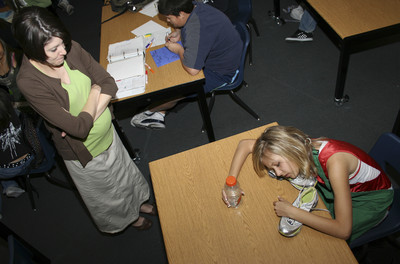ALMOST HOME FREE
It's keeping students home from school, sapping their willingness to do homework and their ability to care.
There's no vaccine for it, and though it lacks publicity, it's an epidemic at large.
Senioritis.
While doctors and parents may be puzzled, high school students know the term well.
Senioritis is what students use during the second semester of their senior year in high school to explain excessive absences, slipping grades and lack of willpower to work.
"We get senioritis because we know that this is it," says Traci Pearce, a senior at Cimarron-Memorial High School. "This is the end of waking up at 6 o'clock in the morning, the end of nagging teachers and going to classes that don't matter."
For many high school seniors, the desire to keep up their grades and still attend classes has long been exhausted. After dedicating most of their lives to their education, they're beginning to both burn out and drop out.
Too many unexcused absences, neglecting to do class work and endless complaining are all symptoms, and teachers and parents still are struggling to find a cure.
"I hate school," says Javy Montoya, a senior at Western High School. "I just sit there and hang out all day."
While well-worn classes and lectures are one reason for decreasing attendance, it's not the only factor that causes senioritis.
"I miss class every week," says Palo Verde senior Stephanie Shadoan. "Anywhere from two to four classes. If I know I don't have homework in my last two classes I go home and work on other assignments. People play sports, have jobs and have family lives to take care of."
Whether their reasons are well-intended or not, students might suffer from consequences far worse than just slipping grades.
"By spring break students think the year is over," says Palo Verde counselor Lynne Herman. "It (senioritis) can still affect their grades and graduation if they fail a second semester class. A lot of seniors think once they are accepted to college it's a done deal, but colleges look at your full transcript, including that last semester. An acceptance letter can be pulled."
That's a sentiment shared by Palo Verde assistant principal Jessica Pinjuv.
"I think student attendance is the number one indicator that a student will achieve," she says. "It is extremely important for a student's success."
Although many students manage to scrape by in their final semester, schools still are forced to get involved in keeping kids in class.
"If a student doesn't have a full load of classes, I try to encourage them to take more core classes," Herman says. "When students take fluff elective classes to raise their GPA they get tired and stop going."
Palo Verde senior Timmy Scott agrees.
"Most senior classes are brain dead classes," he says. "There also isn't as much urgency in the morning to get up for a half-day."
The majority of schools, however, attempt to intervene before students fall too far behind.
Notices are issued midway between each quarter to inform parents of slipping grades. Parents also are notified if a student is often truant.
"We usually call the parents when students start missing a lot of school," Herman says "That can make a huge difference, especially if the parents don't know their child is missing school."
With all the consequences many students are forced to come to class, regardless of their motivation -- or lack thereof.
"I know if I don't come to class I won't graduate," says Palo Verde senior Andrew Blanc. "I don't want to come back to this place. That's my motivation to come to school."
R-Jeneration

















